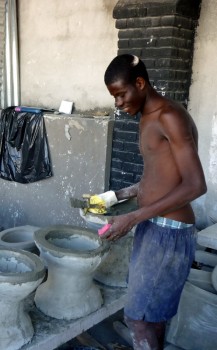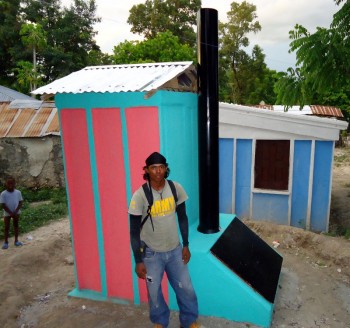Haiti: Two years after the earthquake

Much has been written about the slow pace of reconstruction in Haiti. While those reports are largely true, there are also positive developments. The EcoSur partner Sofonias Haiti is reporting encouraging facts and looks with hope into the future.
The affected area in and around the capital Port-au-Prince still looks unorganized, dirty and the chaotic traffic makes everything much more difficult. However, not all of this is new to this city that has grown at an extremely high speed over the last 20 years,about 3,7 million people are believed to live in the metropolitan area, nearly half the population of the country. Many ruins still have not been cleared and reconstruction so far has been mainly by private people, often only covering up the cracks. The few new constructions, built without construction permits and supervision generally commit the same construction errors as before.

EcoSur started its engagement in march 2010, two months after the disaster. Counting on specialists from SofoNic, a workshop for construction materials was started in the rural town of Liancourt which lead to the construction of a school complex and 40 small durable shelters for homeless families. Fifteen young men were instructed in production of ferrocement panels and masonry. This small project is totally different from most other projects implemented in Haiti:
A different strategy: Solid shelters instead of provisional ones EcoSur is opposed to the strategy used by most foreign aid projects, who concentrated on building so called "provisional units" made mostly of imported wood. We are clear, that the really poor have no means of replacing ever their provisional shelter with a good house, the unit made of timber and plywood will eventually become another shack, repaired with whatever they can find.....the earthquake reconstruction turns into another slum. EcoSur decided to build solid, lasting structures out of ferrocement panels, produced on site by the newly formed team. Those shelters turn out to be also faster than the imported ready-made ones, of course they are more durable and they are lower cost than most others and they even look better. Although the ferrocement shelters are as small as most others (the standard set for international aid project was 18 m2), the users will likely be able to add another part to them with whatever material, as they do not have to spend money on repairing their unit for many years.
EcoSur is opposed to the strategy used by most foreign aid projects, who concentrated on building so called "provisional units" made mostly of imported wood. We are clear, that the really poor have no means of replacing ever their provisional shelter with a good house, the unit made of timber and plywood will eventually become another shack, repaired with whatever they can find.....the earthquake reconstruction turns into another slum. EcoSur decided to build solid, lasting structures out of ferrocement panels, produced on site by the newly formed team. Those shelters turn out to be also faster than the imported ready-made ones, of course they are more durable and they are lower cost than most others and they even look better. Although the ferrocement shelters are as small as most others (the standard set for international aid project was 18 m2), the users will likely be able to add another part to them with whatever material, as they do not have to spend money on repairing their unit for many years.
In march 2012 a second group of 10 units will be built, two of them expanded as full houses and applying a credit scheme.
Otji toilets in Haiti Another project concentrates on sanitation. The Otji-toilet project that was reported earlier in the E-magazine has grown into a sustainable business. Two years after the earthquake the team has installed more than 200 toilets, 155 of them in a housing project of the "Carter Works Program" and another 100 are being commissioned. For this program the Ecuadorian practice of combining the toilet with a shower stall was taken up, combined with rain water collection. There are now some 30 young Haitians who have the basic knowledge to build them, and thanks to an intervention from the EcoSur Foundation in Ecuador they also produce improved urine separation bowls UDDTs (Urine diversion dry toilet). Of course, all the shelters in Liancourt also have their toilets.
Another project concentrates on sanitation. The Otji-toilet project that was reported earlier in the E-magazine has grown into a sustainable business. Two years after the earthquake the team has installed more than 200 toilets, 155 of them in a housing project of the "Carter Works Program" and another 100 are being commissioned. For this program the Ecuadorian practice of combining the toilet with a shower stall was taken up, combined with rain water collection. There are now some 30 young Haitians who have the basic knowledge to build them, and thanks to an intervention from the EcoSur Foundation in Ecuador they also produce improved urine separation bowls UDDTs (Urine diversion dry toilet). Of course, all the shelters in Liancourt also have their toilets.
More workshops for ferrocement panels
Most of the panels for the toilets are produced in a workshop set up in Delmas, in the Metropolitan area, where also the metal doors and other parts of the toilets are produced by a team trained by EcoSur. Another workshop has been installed in the town of Jacmel on a contract with a Portuguese NGO and presently the preparations for the creation of a micro-enterprise for women producing materials and building houses are underway, within a program of UNDP. This includes the construction of model structures in the Metropolitan area, one of the first official reconstruction programs!
Sofonias Haiti in formation
The EcoSur network has a new member.....the Nicaraguan team has decided to start the legal procedures to register as an international NGO. The Instructions on how to proceed are straight forward, but require a large amount of different documents, but it seems there are plenty of stumbling blocks to be encountered, reports from other NGO's do not sound encouraging. However, the first steps have been taken....
Trade education A main component in all EcoSur projects is training and education for builders. The input from formal apprenticeship programs in Nicaragua and Ecuador is the key aspect. It is not only the professionals that have guided the longstanding masonry education program of SofoNic, but also several of their ex-students. Five young masons who graduated from the school in Nicaragua have been spending time in Haiti, teaching and directing constructions. Fernando Jimenez who graduated in 2005 will soon comply two years in Haiti and by now is fluent in Kreole.
A main component in all EcoSur projects is training and education for builders. The input from formal apprenticeship programs in Nicaragua and Ecuador is the key aspect. It is not only the professionals that have guided the longstanding masonry education program of SofoNic, but also several of their ex-students. Five young masons who graduated from the school in Nicaragua have been spending time in Haiti, teaching and directing constructions. Fernando Jimenez who graduated in 2005 will soon comply two years in Haiti and by now is fluent in Kreole.
Our partner "Appel" in Liancourt runs a trade school, teaching men and women practical trades, from cooking and baking all the way to motor mechanics. The EcoSur mason training program is of course integrated into the school. Grupo Sofonias has been able to act as a bridge for Appel to get a grant from the Swiss Solidarity fund and it is encouraging to see that the school has gained momentum since they are able to pay their teachers in time.
A summary of EcoSur projects in Haiti (and their donors)
Workshop "St Fridolin" in Liancourt (financed by a collect in Glarus, Switzerland)
Housing project in Liancourt (DESWOS, Germany)
School compound in Liancourt (Eirene, Suisse)
Toilet project (DESWOS and Medeor, Germany)
Delmas 31 (City of Zürich, Switzerland and Amina, Austria)
Jacmel (contract for OIKOS, Portugal)
Leogane (contract for Habitat for Humanity)
Women's workshop (contract for UNDP)
School construction in Rang (Medeor, Germany)



